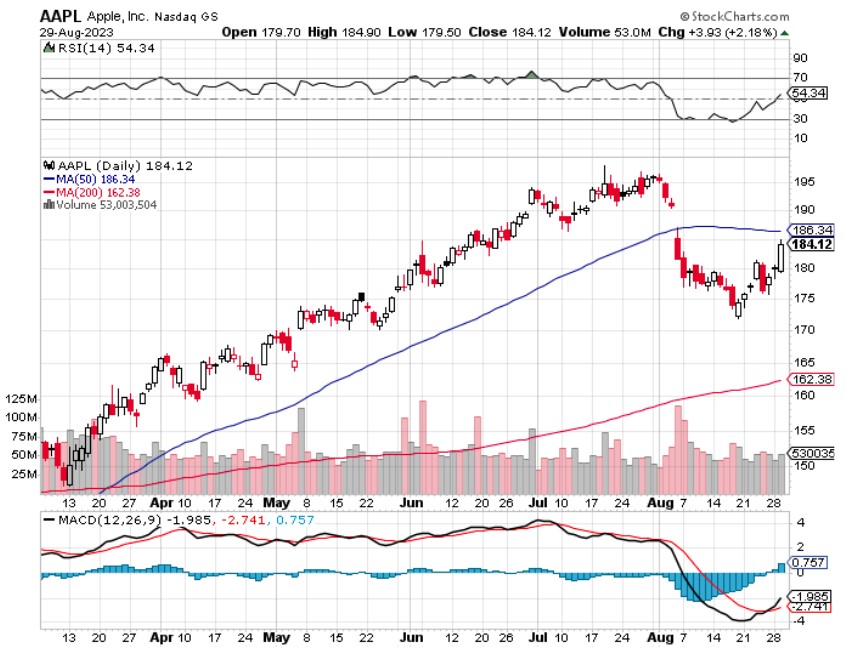THE AI ORCHARD
(AAPL), (MSFT), (GOOGL)
Apple (AAPL) has once again broken records, recently crossing a staggering $3 trillion valuation a mere five years after achieving its $1 trillion milestone. While this achievement is monumental, some industry watchers find themselves questioning Apple's seeming reticence in the rapidly advancing AI sector, especially when rivals such as Microsoft (MSFT), Google (GOOGL), and OpenAI make daily headlines.
At a casual glance, Apple's involvement in AI seems mainly confined to Siri's responses and the improvements in Apple Maps. But for those familiar with Apple's modus operandi, this quietude could be seen as the tech giant biding its time, waiting for the ideal moment to make a significant move.
Evidence of Apple's deepening interest in AI can be found in its recruitment activities.
The company's AI careers page bristles with excitement over innovative roles, and earlier this year, Apple advertised for 28 new AI positions. They've also been amassing talent for their uniquely named Machine Intelligence, Neural Design (MIND) group, signaling a focus on everything from advanced language model research in Paris to optimizing these models for mobiles without dependency on cloud-based operations.
While other tech giants have made significant strides with AI chatbots and digital assistants, Apple seems to be taking a different trajectory. Their current vacancies suggest a pivot towards Large Language Models (LLMs) tailored for the mobile ecosystem.
This isn't just another technological leap; it's about transforming how users experience AI on mobile devices.
Given Apple's historical approach to innovation, their strategy appears more calculated than cautious.
This perspective is further affirmed by Tim Cook's discussions with investors, highlighting the company's heavy investment in AI, with the recent $3.1 billion increase in R&D spending being partly attributed to AI projects. My recent conversations with insiders hint that Apple's strategy may revolve around the integration of generative AI into their existing product line.
Moreover, Apple's focus isn't solely on software—it's about optimizing where that software functions.
The company seems intent on executing sophisticated AI directly on mobile devices, sidestepping the need to sync with the cloud constantly. Such a move isn’t just about speed; it's a clear nod to enhancing user privacy, a domain where Apple consistently seeks to differentiate itself.
This speculation once again finds support in Apple’s recent recruitment ads, one of which seeks expertise to bolster an "on-device inference engine." Another talks about blending "state-of-the-art foundation models" with mobile devices to pioneer AI experiences grounded in user privacy.
However, AI isn’t Apple's only focus.
Their recent acquisition of an AI music startup known for producing personalized soundtracks through artificial intelligence suggests that they might be setting their sights on the music and entertainment industry, harnessing the power of AI.
Apple’s historical prowess in music, from the iPod to iTunes, means they are well-placed to revolutionize the AI music landscape.
Another potential avenue? Health and wellness.
Given Apple's emphasis on health through products like the Apple Watch, the integration of AI could transform how users track and understand their well-being, providing real-time insights and personalized coaching.
For entrepreneurs and businesses, Apple’s measured entry into the AI sector might seem like a brief respite. With one less tech titan to contend with, market dynamics might be easier to predict.
But it would be unwise to underestimate Apple.
Their dominance in the smartphone market ensures that any significant AI development will need to align with or, more aptly, be approved by Apple. They've subtly positioned themselves as gatekeepers in this space.
History underscores Apple's strategy. They've often observed, learned, and then released a product that redefines the market—think iPhone and iPod. As AI innovations like OpenAI’s ChatGPT and Google’s Bard garner attention, Apple's decision not to rush into a market debut seems consistent with their brand philosophy: quality over speed.
While it may seem like Apple is trailing in the AI narrative, its strategic movements suggest otherwise. Their robust track record in tech innovation means when they do make their play in the AI space, the world will undoubtedly sit up and take note.



